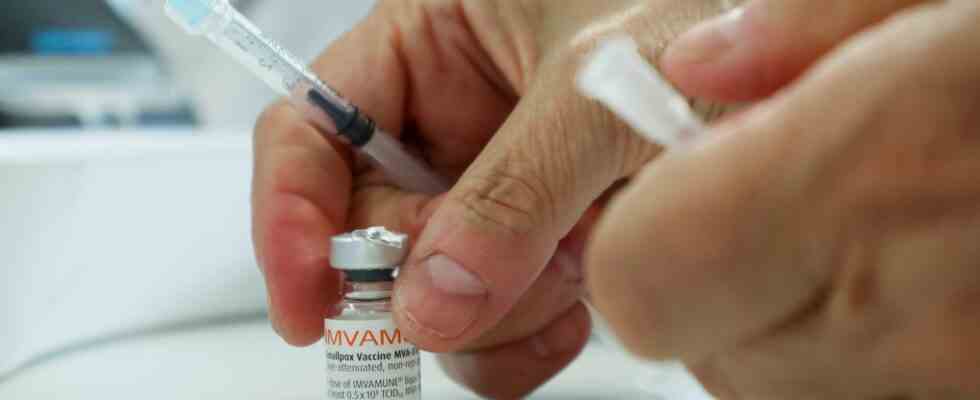Status: 06/14/2022 12:57 p.m
The WHO recently reported nearly 1,300 cases of monkeypox in countries outside of Africa. Now the EU wants to buy more than 100,000 doses of vaccine against the disease from a Danish biotech company.
The European Union plans to buy around 110,000 doses of monkeypox vaccine. EU Health Commissioner Stella Kyriakides announced that she intends to sign a corresponding agreement with the Danish biotech company Bavarian Nordic today.
According to Kyriakides, the first cans should be delivered to the EU countries by the end of June. According to Bavarian Nordic, the delivery of the vaccine should start immediately and be completed in the coming months.
The European Medicines Agency (EMA) recently said it was in talks with Bavarian Nordic that could allow approval of its smallpox vaccine Imvanex to be extended to include monkeypox. In the USA, the vaccine is already approved for use in monkeypox.
Around 900 cases of monkeypox in the EU
According to the EU Health Commissioner, there are currently around 900 cases of monkeypox in the EU, and around 1,400 worldwide. The World Health Organization (WHO) recently presented similar figures: According to this, almost 1,300 cases of monkeypox have been reported in countries outside of Africa – most of them of which in men who have sex with men. Experts had warned of the virus spreading, for example at upcoming festivals and parties.
The disease with monkeypox
Monkeypox is considered a less severe disease compared to smallpox, which has been eradicated since 1980. According to the RKI, the incubation period is five to 21 days. Symptoms (including fever and skin rash, for example) usually go away on their own within a few weeks, but can lead to medical complications and, in very rare cases, death in some people. Monkeypox occurs mainly in West and Central Africa and very rarely spreads to other countries, making the current trend unusual.
Can monkeypox be transmitted through sex?
In Italy, fragments of the monkeypox virus have now been detected in the semen of a handful of patients for the first time. This raises the question of whether sexual transmission is possible. Researchers at the Spallanzani Institute in Rome have detected the genetic material of the virus in the semen of six out of seven patients at the facility. In particular, a sample from a single patient examined in the laboratory suggests that the virus found in his semen is capable of infecting and replicating another person.
However, these data were not enough to prove that the biological properties of the virus and its transmission had changed, the institute’s director general, Francesco Vaia, told Reuters news agency. However, the find speaks strongly for the hypothesis that the virus is also sexually transmitted. The WHO had been informed.
A photo provided by the Institute of Tropical Medicine Antwerp shows skin symptoms in monkeypox patients. Infections with the virus are now being reported from more and more countries.
Image: Institute of Tropical Medicine Antwerp/dpa
According to the Robert Koch Institute, transmission from person to person is only possible with close contact – for example through contact with the typical skin changes or through excreted respiratory secretions and saliva. According to the RKI, it has not yet been finally clarified whether monkeypox can be spread through semen or vaginal secretions, but it seems possible.
Germany has also ordered a vaccine
Some EU countries, including Germany and Spain, had already placed their own orders with Bavarian Nordic. Health Minister Karl Lauterbach announced that around 40,000 vaccine doses could be delivered in June, and another 200,000 later in the year.
In Germany, the Standing Vaccination Commission (STIKO) recommended monkeypox vaccination for certain risk groups and people who had close contact with infected people last week. The STIKO sees an increased risk of infection in men who have same-sex sexual contact with changing partners.
Staff from special laboratories may also be eligible for preventive vaccination. The draft decision of the recommendation now has to go through a so-called commenting procedure and is not yet a final official recommendation.
229 sick people in Germany
A good three weeks ago, the first patient with monkeypox became known in this country. The number of monkeypox proofs recorded by the RKI in Germany has now risen to more than 200: The RKI gave the number of patients on its website as exactly 229, after around 190 the day before. Furthermore, no cases in women and children are known, said an RKI spokeswoman on request. According to the institute, eleven federal states have reported those affected by the viral disease. There are particularly many in Berlin, where 142 cases were registered as of Monday.
The RKI’s risk assessment continues to be: “According to current knowledge, the RKI assesses a risk to the health of the general population in Germany as low.” There are still isolated transmissions, “but the outbreak tends not to develop exponentially growing numbers of cases,” said Timo Ulrichs, an expert in global health at the Akkon University of Human Sciences in Berlin.

